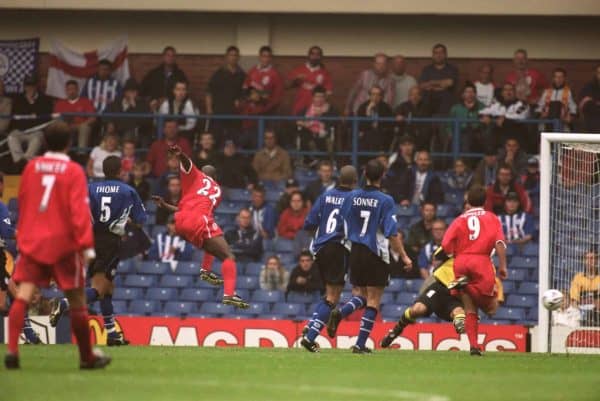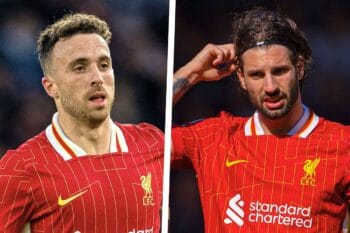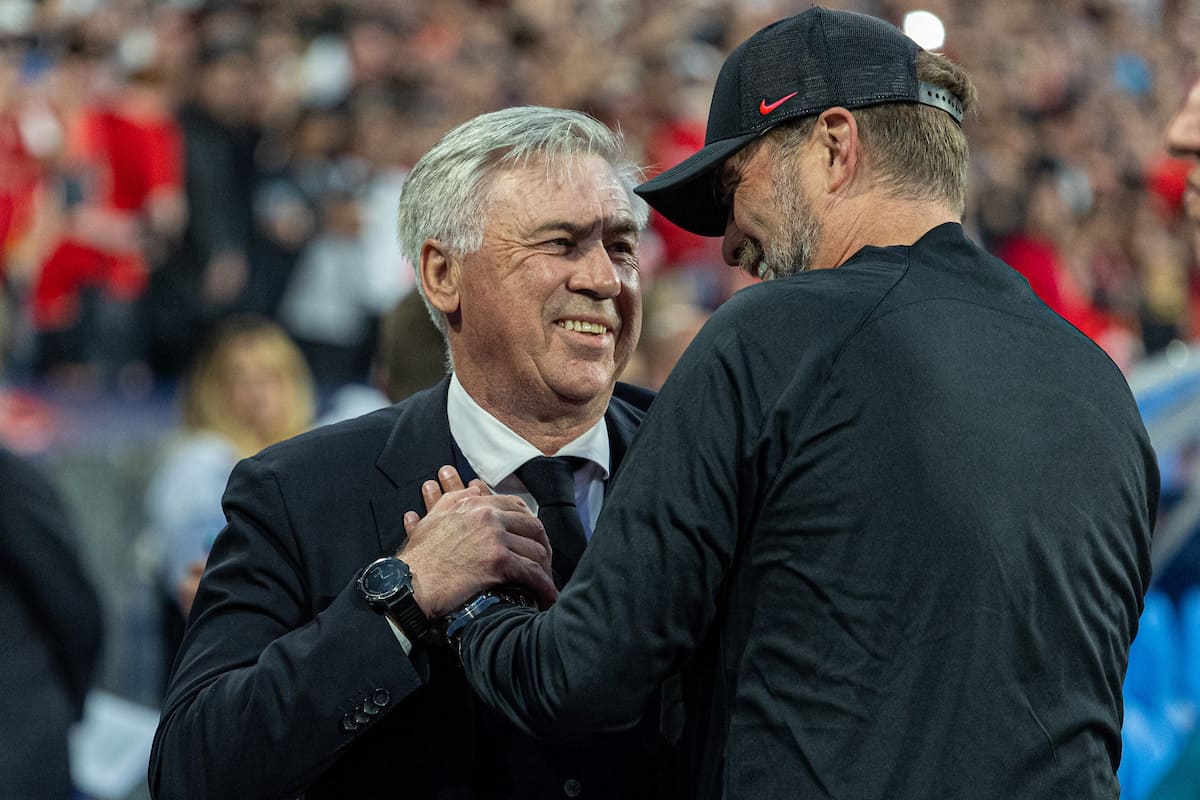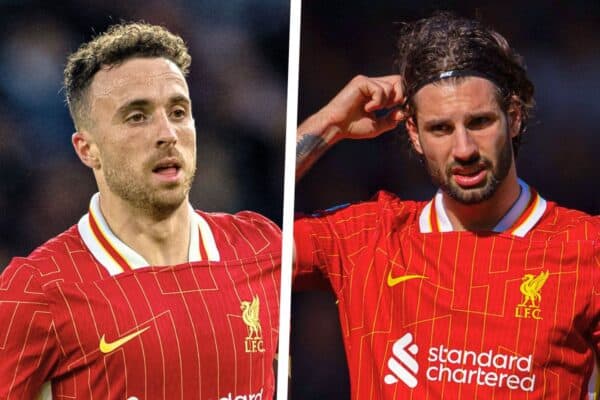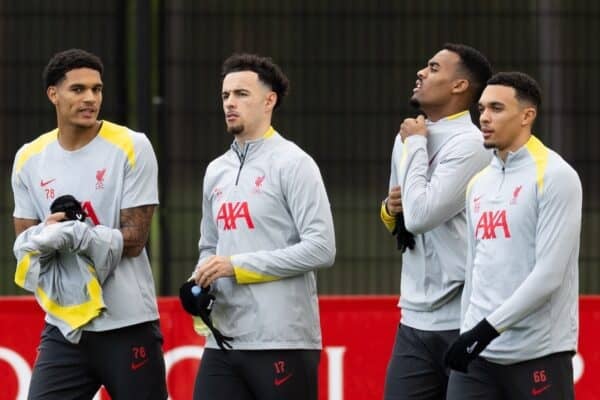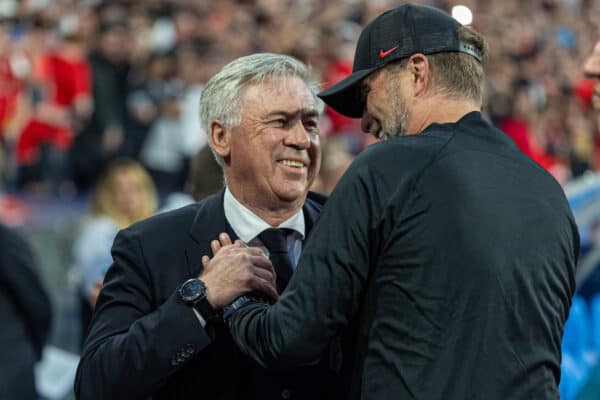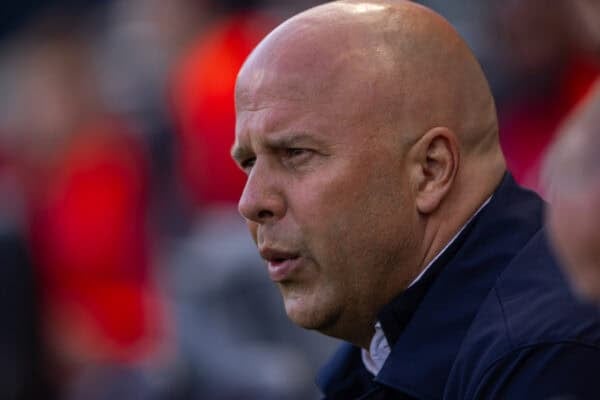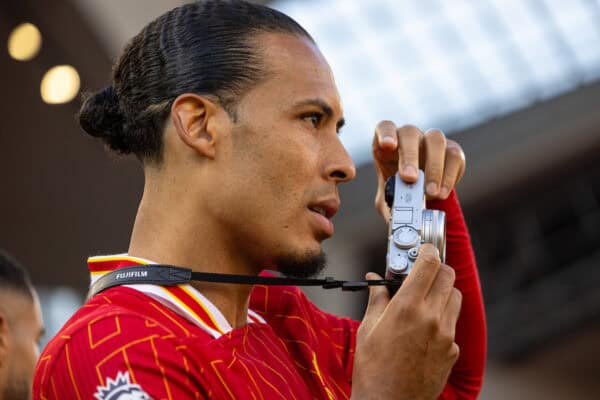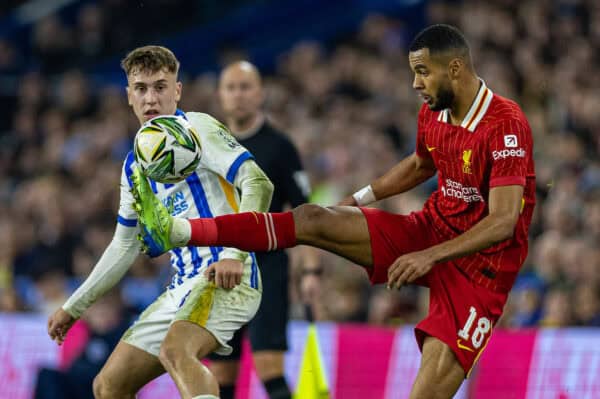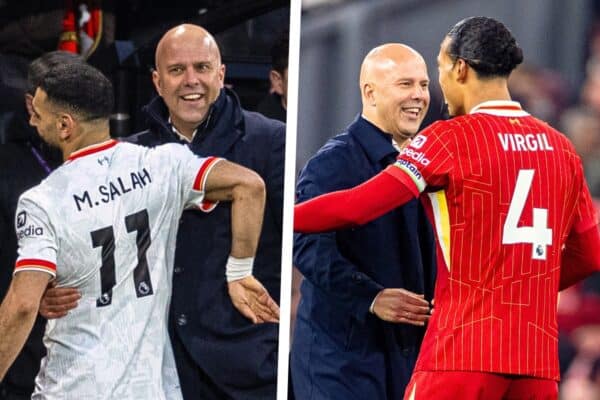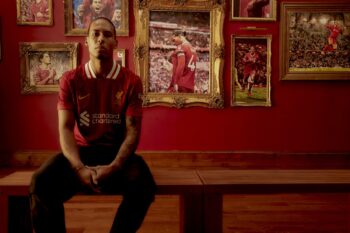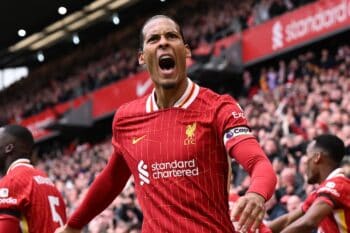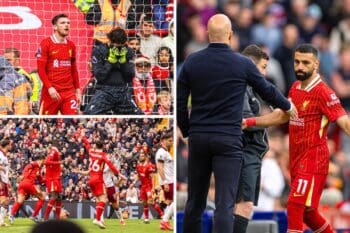Some players in Liverpool’s history have been considered great enough to be included in the official website’s ‘100 Players Who Shook The Kop.’ Some other players have been considered memorable for their unique personalities or otherwise, and have been included in humorous lists such as The Liverpool Way’s 10 Players Who Shook The Kop (With Laughter)’.
Then there are those who managed to make both lists – Titi Camara is one of them (Djibril Cisse and Erik Meijer are another two). What can be said to be common to all three of those (other than that they were all strikers) is that they had a short but eventful career with Liverpool. If you’ll excuse the pun, it’s perhaps appropriate to say that Titi Camara’s Liverpool career came and went in a flash.
Aboubacar Sidiki (Titi) Camara was born in Conakry, Guinea, on November 17th, 1972. His skills quickly developed to such a level that at the age of seventeen he was signed by French club St. Étienne in 1990. At this time, he was a highly rated young prospect, scoring sixteen goals in ninety four Ligue 1 appearances, and it wasn’t long before he was making his mark in the game and developing into a talented striker. In the summer of 1995 he was sold on to Lens, where he scored fourteen goals in sixty three appearances, and who in turn sold him on to Olympique Marseille two years later in 1997.
Titi’s career at Marseille began well with a run of thirty one games in his first season, but only scoring two goals. His second season was an improvement on that with six goals in thirty Ligue 1 games, plus a couple more goals in the UEFA Cup. By this time he had developed a reputation for being fast, being able to shield the ball while running at goal, and scoring spectacular goals. As Marseille had finished in fourth place at the end of the 1997-98 season, they were entered into the UEFA Cup for the following season. Marseille went all the way to the final, where Titi Camara had a chance to show his talents in front of a world-wide audience. It was not the best of performances as Marseille lost 3-0 to Parma. Meanwhile in Ligue 1, Marseille finished in second place, and thus would be entered in the Champions League for the following season. Marseille had several quality strikers at that time, including Fabrizzio Ravenelli, and Christophe Dugarry, both of whom were typically selected ahead of Titi for many games, preventing him from having a consistent run of appearances. The chance to play Champions League football was not enough to keep him at Marseille, and so when Gerard Houllier offered him the opportunity to sign for Liverpool, he took it with little hesitation, becoming the first Guinean footballer in England, for a fee of £2,600,000.
Liverpool were of course a club famous throughout Europe, and Titi Camara knew a lot about them from watching them in Premier League and European matches on television. In one instance, he was amazed at how the supporters would get behind the team when they were losing as much as when they were winning. Referring to the Manchester United match at Anfield (May 5th, 1999) he recalls:
‘œThe atmosphere was something else. When Liverpool went 2-0 down the fans never got on their backs. On the contrary, they tried to get behind them. That is beautiful and it doesn’t happen in France. It was clear that the Liverpool fans like people who give everything. I can’t wait to play there.’ [Liverpool scored two late goals from a Jamie Redknapp penalty and another (appropriately) from Paul Ince, to make it 2-2].
Titi Camara’s debut for Liverpool came on the seventh of August, 1999, against Sheffield Wednesday at Hillsborough. It was also the debut for Sander Westerveld, Erik Meijer, Vladimir Smicer, Dietmar Hamann, and Sami Hyypia. It was a dream start as Liverpool won 2-1 with goals from Robbie Fowler after 75 minutes, and the winner from Camara nine minutes later. Titi’s goal came after a powerful 25 yard shot from Fowler was parried by the keeper, falling to Titi just inside the area, where he placed it into the net with a left footed strike. He’d had a fair number of chances up to that point, but one thing that became his trademark there and then was his unpredictability. There were earlier chances that were not attempted to be taken, followed by chances that came unexpectedly out of nowhere.
As soon as he appeared at Anfield he became a crowd favourite. His beaming smile and his entertaining tricks with the ball delighted the fans and infuriated the opposition. It seemed at times that he was just teasing defenders as he flicked the ball up, turned as it came down, backheeled it to a teammate, surged forward to take another pass, and then suddenly unleashed a shot at goal. Only a few weeks before his arrival, people were saying Titi who? Suddenly, here was some player to have come apparently out of nowhere, and he really was some player! Jamie Carragher described it well:
‘œWhen he first came, the first three or four months, we all thought, ‘˜What have we here? ‘“ Pele?’ Every time you gave him the ball he was flicking it over someone’s head or scoring some great goals.’
At the other extreme, he was also becoming well known for making a mess of the simplest moves, such as missing a pass to a teammate only a few yards away, losing possession, and shooting wildly off target instead of passing for a better chance. He was hot and cold through the season, and it was trying Gerard Houllier’s patience as he asked for – and expected – more consistency from all his players.
Titi’s most memorable incident was at Anfield, against West Ham, on October 27th, 1999. Liverpool were attacking the Anfield Road end as usual in the first half, and were finding it extremely difficult to break down the Hammers’ defence. Rigobert Song and David Thompson combined to make some space down the right flank, with Song overlapping as far as the goal line, where he crossed the ball low into the centre for Camara to bundle the ball into the goal just a minute before half-time. The joy of the go-ahead goal was soon turned to confusion when Titi collapsed and wept as emotions overcame him. It turned out that his father had passed away during the previous night, and even though it was a devastating loss to him personally, he insisted on playing as he was the only fit striker available on the day. That one incident was enough to put him firmly in the rank of hero with the Liverpool faithful, and strengthened a bond that had been developing since the beginning of the season.
Unfortunately it was not enough for Gerard Houllier who played him less as the season wound down, preferring to leave him on the bench. But recurring injuries to Michael Owen and Robbie Fowler meant that Titi Camara was playing more than the manager had planned. His goalscoring during that period was a respectable one goal every three matches, but it wasn’t good enough for a club (or a manager) with higher expectations. Houllier’s aim was to qualify for Champions League football the following season, which needed a minimum of a third place finish, and so he had signed Emile Heskey from Leicester for a club record fee of £11,000,000. It could be argued that it was that decision not to play Titi so much in the later stages of the season that caused Liverpool to miss out on a Champions League berth. The Reds were winless in their last five, scoring none, and losing away to Bradford in their last-chance match of the season.
The first season at Anfield for Titi Camara was a case of mixed fortunes to say the least. On the one hand, he had played in a total of thirty seven matches, scoring ten goals, second only to Michael Owen. But that total of appearances included thirteen as a substitute as he was increasingly being demoted to the bench for much of the second half of the campaign. Gerard Houllier’s practice of rotation, combined with his insistence on playing Emile Heskey with Robbie Fowler or Michael Owen, meant that Titi Camara was soon seen as a fourth choice striker.
The 2000-01 season didn’t start out with much promise either. Missing out on Champions League football was a disappointment, but at least there was the consolation of entering the UEFA Cup. That is, it would have been a consolation if Titi had been included in any of the plans. The situation went from bad to worse as Gerard Houllier left Titi out of every game, demoting him to the reserves. It wasn’t good enough for him, and he definitely let it be known! That made the situation worse still, and when a transfer request was handed in it was not expected to be denied. Houllier couldn’t quite hide his sudden disdain for the Guinea international in an interview (on the official website):
Titi got injured at half-time in the pre-season friendly with Parma on August 12th. He is the only player I know who has got injured without playing. The injury was so bad that he could only come back seven weeks later. I don’t know what kind of injury he had. So his first game for us was on October 2nd against Manchester United reserves and then he went away to play an international match in Guinea. He came back on October 11th and then we played three games against Derby, Leicester, and Slovan Liberec. He was not involved in the first two but was on the bench for the game with Liberec. The following day he came to see me and said that he did not want to play for Liverpool and that he wanted to leave. If he doesn’t want to play for Liverpool and wear the red shirt, then that’s it. He has told me he wants to be placed on the transfer list, so he has been. Now I will meet with his agent and see what we can do. It disappoints me for the fans and I don’t think it’s being fair on the club. Why he wants to leave I don’t know. I can’t accept that someone who has been available to this club for only 10 days, during which time we played three games and won all three, wants to leave because he is not in the team.
It was in fact the game where he was on the bench (Liberec) that signalled the end of the relationship. He was sent by Houllier to warm up along the touchline for the entire second half, but with no intention of using him as a substitute in a match that cried out for some creativity in attack. Sometimes it’s strange how a manager will talk at length about how a new player he has managed to sign is the biggest coup of his career, and then a year or so later the same player is completely out of favour and up for sale.
One possible destination for Titi was Preston North End (managed by David Moyes) who were interested in taking him on loan for the remainder of the season. They needed a player to replace Erik Meijer who was already there on loan from Liverpool, but was in the process of being sold to Hamburg. Another possibility was Wolves, who were also looking for a player on loan. In both cases, the clubs were offering regular first team football, even though in a lower division. In Houllier’s opinion, a loan deal was not good enough, and so when West Ham offered £1,500,000 in December of 2000, his career went south. He failed to make much of an impression with the Hammers, with only eleven appearances and no goals by the end of the 2001-02 season. His reputation became so bad that he’s often described as the worst player ever for West Ham!
One more chance was given in the summer of 2002 when he had a much more impressive pre-season, but he was soon sent out on loan to Saudi Arabian club Al-Ittihad. From there he made a permanent move to Al-Siliya in the summer of 2003, followed by a final move back to France to finish up his career at Ligue 2 club Amiens. At least at those clubs he was able to rediscover his goal scoring prowess, and was also able to continue to play for Guinea. His international career was quite successful with appearances in the African Nations Cup in 1994, 1998, and finally in 2004 where they reached the quarter-finals.
Titi Camara Video: 100 Players Who Shook The Kop
One bizarre event in the career of Titi Camara was his selection for a commemorative t-shirt for an Irish clothing company. It was sold along with other shirts celebrating other famous players such as Maradonna, Valderrama, Robbie Keane, and Henrik Larsson. There doesn’t seem to be any particular reason for the inclusion of Titi, but it was apparently a very popular seller.
Titi Camara retired from competitive football in 2006, and was hoping to return to Guinea as the head coach of the national team, who had qualified for the African Nations Cup once again. That move was not successful as he was overlooked in favour of Robert Nouzaret. His next move was hoping to run for president of the Guinea Football Association, but was disqualified from the election for lack of experience. The rules of the Guinea FA require candidates to have at least four years experience at managing a team or an association.
It would be no surprise if Titi’s memories of his days with Liverpool were less than complimentary, but in fact he speaks as fondly of those times as much we speak fondly of him:
‘œAt Liverpool, I was lucky enough to be playing for a great club but unfortunately things didn’t go well with Gerard Houllier. The memories I have from Anfield will stay with me right until my final days. It’s not that I lacked ambition. The first season went very well, but after that Gerard Houllier wanted to stop me playing for Guinea. He wasn’t happy when I left and when I got back, he decided to sideline me. It was sad for the fans, because I’d given quite a lot to Liverpool and I’d also learned a lot from Liverpool in return. That’s part of a footballer’s life. There are times when a coach decides a footballer’s fate and it’s sad.’
There must be something special about a player who is so fondly remembered even though he effectively only played for one season at Liverpool. You just have to mention the name Titi and it brings a smile of remembrance for a wonderfully entertaining player who lit up the game for so many, even though it was for so short a time. When Liverpool supporters were asked to vote on their top ten players of all time for the ‘œ100 Players Who Shook The Kop’, Titi Camara came in at 91 ‘“ ahead of players such as Nicolas Anelka and Nigel Clough.
